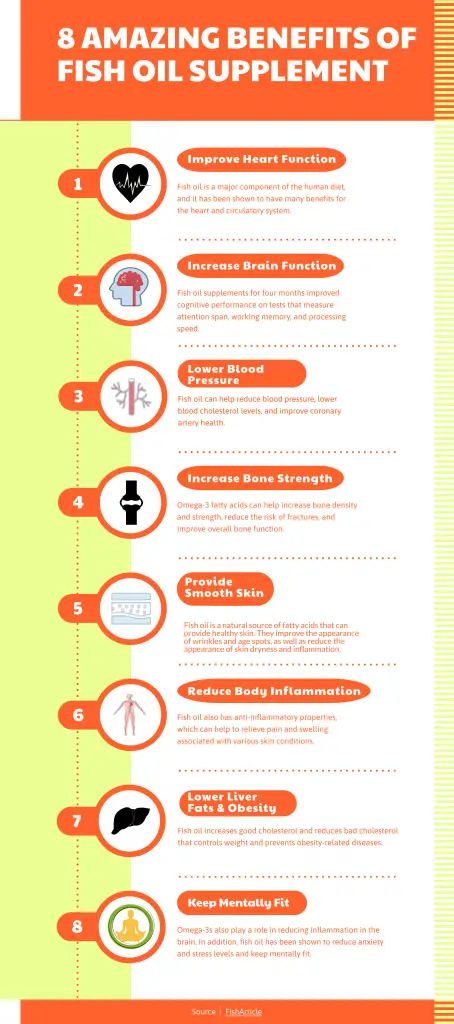Fish oil is a great source of omega-3 & omega-6s fatty acids. These fatty acids can help improve heart health, brain function, joint health, and other problems. Fish oil is a good source of DPA and EPA, two important omega-3 fatty acids.
Besides fish oil benefits, fish oil supplements also come with a number of risks, including side effects from contaminants in the oil and mercury toxicity. It is important to be aware of the benefits and risks of fish oil supplements before taking them to ensure that they are providing the best possible health benefit for you.
In this article, we’ll take a look at some of the best sources of fish oil and discuss the benefits they offer as well as their possible side effects.

What is Fish Oil
Fish oil is a type of omega-3 fatty acid. Omega-3 fatty acids are important for your health because they help reduce the risk of heart disease, stroke, and other chronic diseases.
Is Fish Oil Good For You?
Fish oils are a popular supplement and are often taken to improve heart health. But do they really work?
A study looked at data from more than 26,000 people who took part in two large trials of fish oil supplements. The results showed that fish oils did not reduce the risk of heart attack, stroke or death from heart disease.
While these findings suggest that fish oils may not be beneficial for everyone, there may still be some people who could benefit from them. More research is needed to determine who these people are.
Is Omega-3 Good for you?
The answer to that is definitely yes. Fish oil has been shown to be beneficial for the heart. It can help lower bad cholesterol levels and triglyceride levels. It can also help keep the arteries open and improve blood flow.
How Does Fish Oil Work in Human Body
Fish oil is a type of lipid found in the membranes of cells in the body. Fish oils are made up of triglycerides, which are a type of fat. The body can convert these triglycerides into energy or other types of molecules.
Besides, A type of fat that is found in many types of fish. It is a good source of omega-3 fatty acids. Omega-3 fatty acids are important for human health because they help to prevent heart disease, stroke, and other diseases.
Fish oil can help to protect the heart by helping to decrease the risk of heart disease. Fish oil can also help to improve blood clotting abilities. Fish oil can also help to improve cognitive function by improving memory and mental health.
Types of Fish Oil
There are three main types of fish oil: omega-3, omega-6, and balanced.
1. Omega-3s
Omega-3s are essential fatty acids found in cold-water fish like salmon, herring, tuna, and cod. They’re good for heart health because they help lower bad cholesterol levels and reduce the risk of heart disease. These fatty acids help reduce inflammation and improve heart health.
2. Omega-6s
Omega-6s are essential fatty acids found in meat and vegetable oils. They’re good for your body because they play a role in forming cell membranes and other structural proteins. But too much omega-6 fatty acid can increase the risk of chronic diseases like heart disease, arthritis, obesity, and cancer.
List of Fish & Shellfish Provide Fish Oil
A list of fishes that provide high levels of omega-3 fatty acids has been compiled. These fish can be eaten fresh or frozen and can be purchased fresh, frozen, or in canned form.
Fish oils can be found in many different types of foods, such as seafood, eggs, and nuts. It’s also possible to get them as capsules or as a dietary supplement. As with any supplement, speak with your doctor before taking fish oil supplements if you have any other medical conditions or are pregnant.
These are the top eight fish that provide the most omega-3 fatty acids:
1. Salmon
This fish is a great source of both omega-3 fatty acids and protein. It can be cooked in many different ways, including grilled or baked.
2. Mackerel
Mackerel is another great source of omega-3 fatty acids and protein. It can be grilled or boiled and is also a good choice for sushi.
3. Halibut
Halibut is a versatile fish that can be cooked in several ways, including boiled, steamed, or grilled.
4. Tuna
EPA and DHA are both found in marine animals tuna. EPA is more anti-inflammatory than DHA and can be better for your heart health, while DHA is more supportive of cognitive function.
5. Herring
herring fish contain high levels of fish oil, including salmon, mackerel, tuna, herring, and sardines.
6. Sardin
Fish oils can be found in many different forms, including capsules, pills, and liquid extracts. The most common types of fish used for supplementation are sardin.
Fish Oil Benefits

1. Improve Heart Function
Fish oil is a good source of omega-3 fatty acids, which are important for heart health. Studies have shown that fish oil can improve heart function in people with heart disease or who have risk factors for heart disease. Fish oil can also improve heart function in people who have healthy hearts.
2. Increase Brain Function
The human brain is made up of over 100 billion cells. A single fish oil capsule can provide the equivalent of 3 to 4 servings of omega-3 fatty acids, which are known to play an important role in cognitive function.
When ingested, these fatty acids are converted into molecules called prostaglandins, which have many different effects on the body and brain. One study found that people who had higher levels of omega-3s in their blood were less likely to have problems with memory and thinking skills.
A study published in the journal Nutrition Reports found that fish oil supplementation improved memory and cognitive function in elderly people with mild cognitive impairment (MCI). The participants who received fish oil had better scores on tests of episodic memory, working memory, and global cognitive function than those who did not receive fish oil.
Fish oil has been shown to improve memory and learning in children. The benefits of fish oil for child memory may be due to its role as an anti-inflammatory agent, its ability to support cognitive development, or its contribution to overall good health.
3. Lower Blood Pressure
Fish oil is a powerful natural blood pressure reducer. In fact, a single 2 gram (g) serving of fish oil can lower blood pressure by up to 3/2 points in people with hypertension, according to some studies.
The key to fish oil’s BP-lowering properties appears to be its ability to improve endothelial function – the ability of the endothelium, a thin layer of cells that lines the inner wall of arteries and veins, to regulate blood flow.
Fish oils are especially rich in omega-3 fatty acids, including docosahexaenoic acid (DHA), which has been shown to improve endothelial function and reduce blood pressure.
Fish oil is a type of oil that comes from the body of a fish. The oil can lower blood pressure. There are different types of fish oils, but the most common is omega-3 fatty acids. Omega-3 fatty acids can help to decrease the risk of heart disease and stroke. Fish oil has also been shown to be helpful in reducing the risk of diabetes and some types of cancer.
Fish oil is a popular supplement because it has been shown to lower blood pressure. Fish oils are made up of omega-3 fatty acids, which have been linked to lower blood pressure. In one study, people with hypertension who were supplemented with fish oil had reductions in both their average blood pressure and the size of their LDL (bad) cholesterol particles.
4. Increase Bone Strength
Fish oil is a type of omega-3 fatty acid. It has been shown to increase bone strength in rats and humans. Fish oil has also been shown to decrease the risk of fractures in the elderly.
A study published in the journal Bone found that women who took fish oil supplements had stronger bones than those who did not.
The study participants who took fish oil were three times as likely to have strong bones compared to those who did not. Fish oils are rich in omega-3 fatty acids, which are essential for healthy bones.
5. Increase Eye Vision
The retina of the human eye is made up of several layers of cells. The outer layer, or epithelium, receives nutrients from the blood vessels that run through it.
The inner layer, or choroid, helps regulate the amount of light that enters the eye. The retina contains a number of important nerve cells, which send messages to the brain. These nerve cells are responsible for making vision possible.
One important task that these nerve cells perform is transporting nutrients to the other parts of the eye. This process is called retinal transport. One way that retinal transport is assisted by fish oil is by increasing the production of a protein called ARPE-19.
Fish oil can help maintain a healthy eye lens, which can in turn improve your vision. All of these benefits can lead to increased visual acuity or clarity of sight.
6. Provide Smooth Skin
They can provide healthy skin, hair, and nails. Fish oils are also anti-inflammatory, which can help to reduce the symptoms of various conditions such as arthritis.
7. Reduce Body Inflammation
Fish oil is a type of omega-3 fatty acid. Omega-3 fatty acids are important for reducing body inflammation. They can do this by helping to decrease the production of inflammatory chemicals called cytokines.
Fish oil also helps to improve blood flow and protect cells from damage. In addition, fish oil may help to reduce the risk of developing heart disease, stroke, and other types of cancer.
Fish oil is a popular supplement because of its anti-inflammatory properties. The omega-3 fatty acids in fish oil can also help to improve blood flow and promote healing.
8. Lower Liver Fats & Obesity
Fish oil is a great way to lower liver fats and obesity. Fish oil helps to decrease the amount of bad cholesterol in your blood, which can help to reduce your risk for heart disease. Fish oil also helps to increase the number of good cholesterol molecules in your blood, which can help to reduce your risk for stroke.
Fish oil has been found to lower levels of bad cholesterol and triglycerides, which can lead to better heart health. Additionally, fish oil is also beneficial for people who are obese because it helps reduce the amount of fat in the liver. They also help lower the risk of obesity.
9. Keep Mentally Fit
Fish oil is a good source of omega-3 fatty acids. These fatty acids are important for keeping your brain healthy and functioning well. They have been shown to help improve cognitive function, including memory and attention span.
Fish oil is a great source of mental health benefits. It can help improve mood, strengthen cognitive function, and reduce anxiety. In addition, fish oil has been linked with a decreased risk of depression and suicide. Fish oils are also beneficial for people with ADHD. They can increase focus and inhibit hyperactivity. Fish oils may even be helpful in the treatment of Alzheimer’s disease and other forms of dementia.
10. Beneficial for Pregnant Women
Fish oil is a popular supplement for pregnant women because it has been shown to be beneficial for both the mother and baby. Fish oil can help prevent major birth defects of the baby’s brain and spine, decrease the risk of preterm labor, and improve maternal mental health. It can also help increase breast milk production.
Fish oil is a great source of fatty acids and omega-3s that are beneficial for pregnant women. The fatty acids help to improve the baby’s development and may even help to prevent some birth defects. Women who are pregnant or breastfeeding should take a tablespoon of fish oil supplements each day.

Limitations of Fish Oil Supplements
However, like any supplement, there are side effects that can occur. Here is a list of some of the most common side effects of fish oil supplements: diarrhea, nausea, constipation, rash, lightheadedness, headache, and difficulty sleeping. Fish oil supplements have been shown to have a range of potential side effects.
It is always important to speak with a doctor before starting a supplement regimen or changing your diet in general, as there can be potential interactions between different supplements and medications.
Some people also experience jaundice, heart problems, and behavioral changes. It is important to note that not all fish oil supplements are created equal and some may be riskier than others. Always speak with your doctor before starting a fish oil supplement regimen.
Fish oil is a common supplement and has been shown to have many health benefits. However, fish oil supplements also have some risks.
There are a few important things to keep in mind when taking fish oil supplements, including the following:
Fish oil supplements should not be taken by people with heart disease or blood clots.
Fish oil can increase the risk of bleeding, especially in people who are already prone to bleeding.
FAQs
How much omega-3 fish oil is safe?
The health benefits of consuming omega-3 fatty acids are well-known and documented. However, how much omega-3 fish oil is safe to consume?
The answer is not simple, as there is no specific guideline for how much omega-3s a person should consume each day.
However, the American Dietetic Association (ADA) recommends that adults include 2 to 3 grams of EPA and DHA per day from both seafood and plant sources. Therefore, it’s safe to say that consuming a moderate amount of omega-3s – such as 5 to 7 ounces of salmon or 1 tablespoon of flaxseeds – is typically safe.
What happens if I miss a dose?
If you miss a dose of fish oil, it is important to take the missed dose as soon as possible. If it is almost time for the next dose, wait until the next day and take the missed dose then.
Do not take a double dose to make up for the missed dose. Taking fish oil doses on time is important so that your body can get the most out of it.
How should I take Fish Oil?
Fish oil supplements can be taken in different ways, depending on the person’s dietary needs and preferences. A good way to start is by consulting with a health professional who can help you figure out the best way to take fish oil for you.
Some people prefer to take fish oil capsules, while others find them inconvenient. Liquid fish oils can also be consumed orally, adding them to juice or water. Adding fish oil to food is also an option for some people, but it’s important to talk with a nutritionist about which foods are best suited for incorporating this supplement into their diet.
Whatever method of taking fish oil is decided upon, it’s important that it is carefully considered and monitored by a health professional in order to ensure the best results.
What happens if I overdose?
If you overdose on fish oil, it is important to seek medical attention as soon as possible. Overdose symptoms can include headache, confusion, and vomiting. If you are concerned about an overdose, it is best to speak with a doctor or poison control center.
How to add fish oil to your diet?
Fish oil supplements can be a great way to add more omega-3 fatty acids to your diet. The best way to take fish oil supplements is by swallowing a pill, but you can also add them to food. Here are some tips on how to add fish oil to your diet:
The American Heart Association recommends consuming at least 2 servings of fatty fish per week, such as salmon, mackerel, herring, or sardines. You can also supplement with fish oil capsules or liquid drops.
Adding fish oil to your diet may help lower blood pressure and keep the heart-healthy. It may also protect against cancer and other diseases.
Final Words
In conclusion, fish oil has many benefits for both your physical and mental health. Taking fish oil supplements can help improve your heart health, reduce inflammation, boost your mood, and improve your cognitive function. So if you’re looking for a way to improve your overall health, consider adding fish oil supplements to your diet.